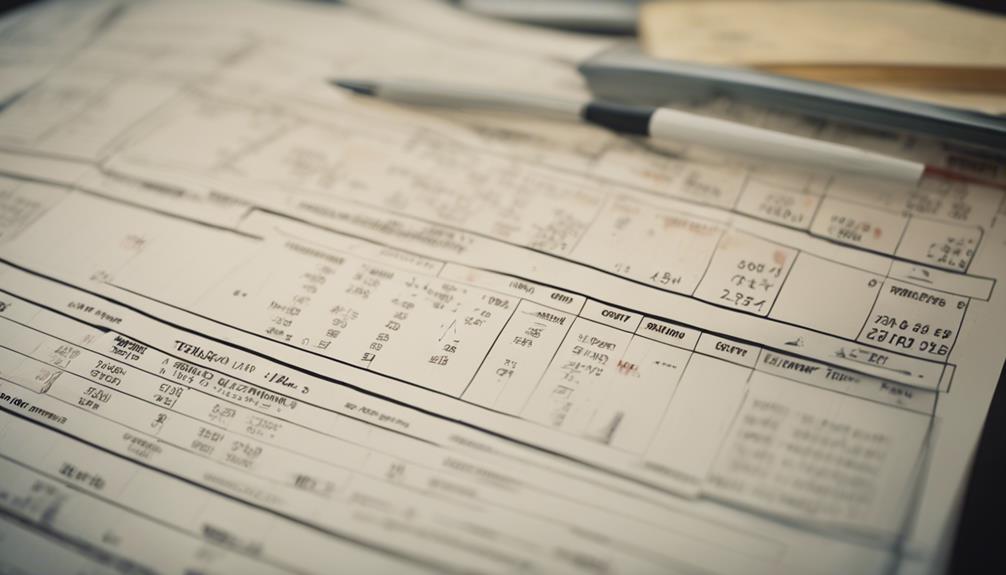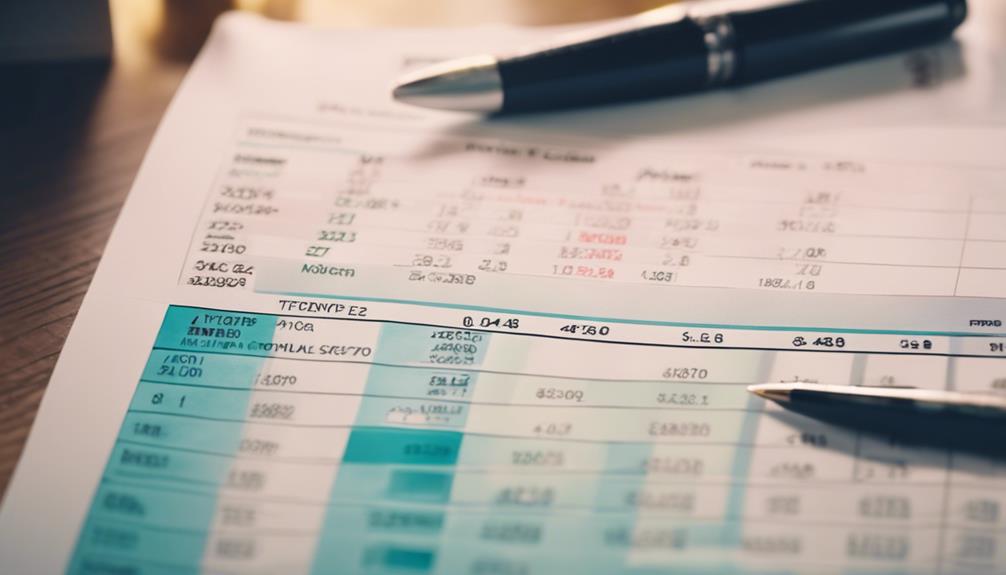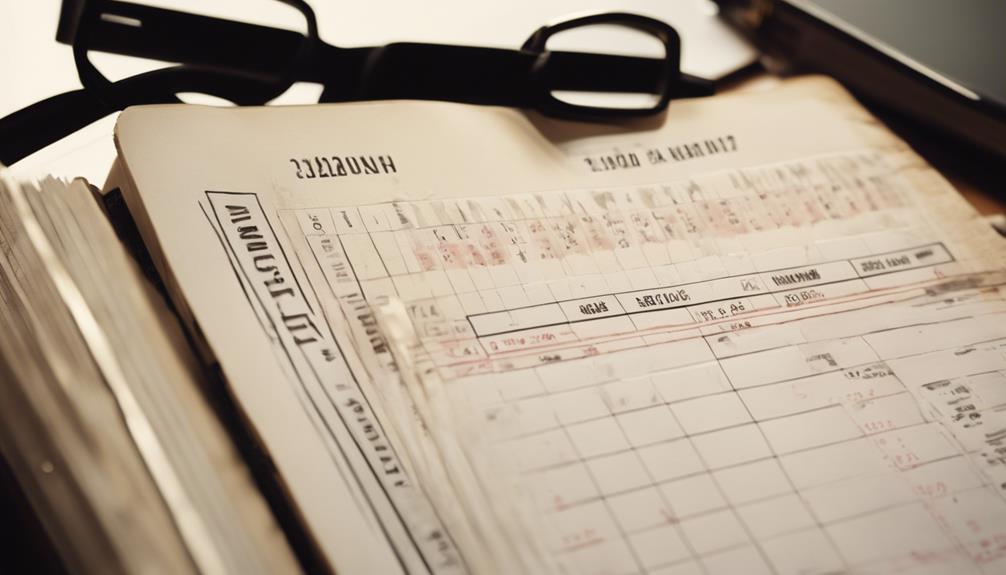Starting & Managing Payment Services
Financial Accounts Demystified: Permanence Vs Temporality
Journey into the world of financial accounts to uncover the distinction between permanence and temporality – a key to unlocking strategic financial insights.

In financial accounts, temporary accounts track short-term data like revenue and expenses, resetting to zero each period. Permanent accounts, consisting of assets, liabilities, and equity, offer continual insights with cumulative balances. Understanding these distinctions is essential for informed financial management and decision-making. Temporary accounts reflect immediate financial performance, aiding in budgeting decisions, while permanent accounts provide a long-term view for evaluating stability. By grasping the permanence versus temporality in financial accounts, you equip yourself with essential tools to optimize your financial understanding and strategic planning. Further exploration will enhance your grasp of financial data nuances.
Key Takeaways
- Temporary accounts reset after each period, tracking short-term financial data.
- Permanent accounts like assets and liabilities provide ongoing financial insights.
- Temporary accounts include revenue and expense accounts for monitoring income and costs.
- Permanent accounts maintain cumulative balances and are crucial for balance sheets.
- Aligning temporary and permanent accounts aids in understanding short and long-term financial goals.
Understanding Temporary Vs Permanent Accounts

Understanding the distinction between temporary and permanent accounts is essential for gaining insight into your organization's financial standing. Temporary accounts, such as revenue and expense accounts, track short-term financial data like business income and costs. These accounts are vital for monitoring financial transactions and are reset to zero at the end of each accounting period.
On the other hand, permanent accounts, like assets, liabilities, and equity accounts, provide ongoing insights into your overall financial status. They maintain cumulative balances and are typically included in balance sheets.
Importance of Temporary Accounts

Emphasizing the essential role that temporary accounts play in monitoring short-term financial transactions is important for maintaining financial transparency and accuracy. Temporary accounts, such as revenue and expense accounts, track money flow within a specific period, offering insights into business performance.
Revenue accounts document income from goods or services, while expense accounts detail money spent on various costs. These accounts are critical for evaluating financial health, aiding in budgeting decisions, and facilitating accurate financial reporting.
Additionally, income summary accounts help summarize revenues and expenses, while drawing or dividend accounts provide shareholders with financial benefits. By utilizing temporary accounts effectively, you can gain a clear understanding of short-term financial activities, enabling informed decision-making and contributing to overall financial stability.
Significance of Permanent Accounts

To fully grasp the financial landscape, recognizing the enduring impact of permanent accounts is crucial. Here are four points to highlight the significance of permanent accounts:
- Provide a long-term view of financial health.
- Include assets, liabilities, and equity accounts.
- Aid in evaluating overall financial stability.
- Contribute to strategic decision-making processes.
Understanding the role of permanent accounts is essential for maintaining a thorough understanding of your organization's financial standing. By utilizing permanent accounts effectively, you can gain valuable insights into the ongoing financial health of your business and make informed decisions to drive future success.
Practical Application of Account Selection

For effective financial management, consider the practical application of selecting the right accounts to meet your specific business needs. Temporary accounts like revenue and expense accounts are vital for tracking short-term financial data such as income and costs. These accounts are essential for understanding your business's financial performance and aiding in budgeting decisions.
On the other hand, permanent accounts like assets, liabilities, and equity provide ongoing insights into your overall financial status, maintaining cumulative balances over time. When choosing between temporary and permanent accounts, it's important to align them with your short-term and long-term financial goals.
Leveraging Automation for Financial Efficiency

Enhance financial efficiency through automation tools tailored to streamline your accounting processes.
- Implement software for automated accounts receivable to speed up cash flow.
- Utilize automated invoicing systems to reduce manual errors and save time.
- Integrate expense tracking automation to monitor spending and stay within budget.
- Explore automated report generation for quick insights into your financial performance.
Frequently Asked Questions
What Is the Impact of Temporary Accounts on Financial Reporting?
The impact of temporary accounts on financial reporting is significant. These accounts, such as revenue and expense accounts, help track short-term financial data like business income and costs. They provide insights into financial performance and aid in budgeting decisions.
Temporary accounts reset balances at the end of each period, ensuring accurate reporting. By utilizing temporary accounts effectively, you can understand your current financial standing and make informed decisions for future financial success.
How Do Permanent Accounts Contribute to Long-Term Financial Planning?
Permanent accounts play a crucial role in long-term financial planning by maintaining cumulative balances that offer a continuous snapshot of your financial status.
Unlike temporary accounts that reset each period, permanent accounts like assets, liabilities, and equity provide ongoing insights. This stability allows for better decision-making, forecasting, and strategic financial management.
Can Temporary Accounts Be Used for Investment Tracking?
Yes, temporary accounts can be utilized for investment tracking. These accounts monitor short-term financial data and can include investment-related transactions.
While temporary accounts reset balances at specific intervals, they can still provide valuable insights into investment performance over shorter periods.
Utilizing temporary accounts for investment tracking allows for more detailed analysis of financial activities and helps in making informed decisions regarding investments.
Are There Exceptions Where Permanent Accounts May Close?
Yes, there are exceptions where permanent accounts may close. In specific situations like a business merger or closure, permanent accounts can be closed to finalize financial records. This process guarantees that all financial transactions are accurately captured and accounted for in the company's final statements.
Keeping track of these exceptions is vital for maintaining accurate and transparent financial reporting practices.
How Does Automation Affect the Accuracy of Financial Data in Accounts?
Automation greatly enhances financial data accuracy in accounts by reducing human error and ensuring timely processing. It streamlines repetitive tasks, improving efficiency and reliability.
How Do Debit Transactions Affect the Permanence Vs Temporality of Financial Accounts?
Debit transactions play a critical role in the permanence vs temporality of financial accounts. These transactions affect the immediate balance of an account, showcasing the temporality of the financial situation. However, they also impact the long-term record, adding to the permanence of the account’s financial history in the world of debit transactions.
Conclusion
In the domain of financial accounts, understanding the distinction between temporary and permanent accounts is vital.
While temporary accounts track short-term data, permanent accounts offer continuous insights into your overall financial standing.
By selecting the right accounts and leveraging automation, you can efficiently manage your finances and work towards your short-term and long-term goals.
Remember, the balance between permanence and temporality in your financial accounts is key to achieving financial success.
Starting & Managing Payment Services
Distribution Businesses Rave About Innovative Payment Solutions
Get ready to revolutionize your payment processes with innovative solutions that distribution businesses can't stop talking about.

Distribution businesses love innovative payment solutions for their user-friendly features, seamless integration, transparent fee structures, extensive accounting integrations, and exceptional ratings. Customized features cater to distribution operations, ensuring enhanced security, simplified billing, and increased efficiency. Reliable support systems with robust tech partnerships, PCI-compliant security, and high uptime guarantee smooth operations. The widespread adoption of these solutions speaks volumes about their effectiveness in streamlining payment processes and optimizing business performance. Discover more about why these solutions are becoming the go-to choice for distribution businesses.
Key Takeaways
- Enhanced security features for safe transactions.
- Simplified billing processes for efficiency.
- Robust support systems for reliable assistance.
- Seamless integration with existing distribution operations.
- PCI-compliant security measures for data protection.
Reasons Why Distribution Businesses Choose Innovative Payment Solutions

If you're a distribution business looking for a reliable payment solution that offers user-friendly features and seamless integration, Innovative Payment Solutions is the perfect choice for you.
With no contracts and $0 hidden fees, you can trust in a service that values transparency. The 100+ accounting integrations guarantee smooth operations, while the unlimited support guarantees assistance whenever you need it. Innovative Payment Solutions is renowned for its 4.8 out of 5-star rating, reflecting the trust and satisfaction of other businesses like yours.
Key Features Tailored for Distribution Businesses

Discover the tailored key features designed specifically to enhance the operations of distribution businesses.
- Seamless Integration: Easily integrates into popular distribution tools for a smooth user experience.
- Enhanced Security: Reduces security liability and guarantees safe card-not-present transactions.
- Simplified Billing: Automatically collects variable payment amounts at the end of each billing cycle for convenience and efficiency.
Support and Reliability for Seamless Operations

For seamless operations, rely on our robust support system and unwavering reliability. With 400+ tech and business partners, including PCI-compliant security measures and dispute management, we guarantee your business runs smoothly. Our unlimited support is there for you whenever you need assistance, making sure that any issues are resolved promptly.
Enjoy a 99.9% uptime, providing you with the confidence that our system is always available when you need it. Easy setup and no contracts make it hassle-free to get started with our service, giving you peace of mind for the long term. Trust in our support and reliability to keep your operations running seamlessly day in and day out.
Frequently Asked Questions
Can I Integrate With My Existing Accounting Software?
Yes, you can integrate our service with your existing accounting software. Get a demo to see how it works seamlessly with over 100 accounting integrations.
There are no contracts or hidden fees, and you'll have access to unlimited support. Our user-friendly system is easy to implement and can process card-not-present transactions efficiently, reducing security liabilities.
Trust our 4.8-star reputation and contact sales for more information on our innovative payment solutions.
Is There a Fee for Using the Payment Portal?
Yes, there's a fee for using the payment portal. It offers a range of features such as user-friendly interface, easy implementation, and compatibility with popular distribution tools.
The fee structure is transparent, with no hidden costs. You can access unlimited support and benefit from reduced security liability.
The portal is perfect for card-not-present transactions. Contact sales to learn more about the fee details and how the payment portal can enhance your business operations.
How Quickly Can I Set up the Virtual Terminal?
You can set up the virtual terminal quickly. The process is straightforward and user-friendly. You'll find it easy to navigate and implement within your business operations.
The virtual terminal works efficiently for card-not-present transactions, reducing security risks. Additionally, it seamlessly integrates with popular distribution tools. This solution enhances your payment processing capabilities and provides a secure platform for managing transactions.
What Kind of Security Measures Are in Place?
When it comes to security measures, our system has you covered. We've implemented high-quality PCI-compliant protocols to safeguard your transactions.
Additionally, our dispute management system guarantees any issues are promptly addressed. With a track record of 99.9% uptime and a network of 400+ tech partners, you can trust in our reliability.
Rest assured, your payments are in safe hands with our robust security features.
Do You Offer Training for Using the Payment Solutions?
Yes, training is available for using the payment solutions. You can access a demo to learn about the features, such as user-friendly interfaces and easy implementation.
The service integrates with popular distribution tools and is ideal for card-not-present transactions. Training helps minimize security liability and guarantees efficiency in payment processing.
With unlimited support, you can navigate the system confidently. Contact sales to get started with the training process.
Conclusion
To sum up, distribution businesses are selecting our innovative payment solution for its unmatched convenience, flexibility, and reliability.
While some may worry about the switch process, our seamless integration and unlimited support guarantee a smooth implementation.
With over 100 accounting integrations and PCI-compliant security, our platform is designed to streamline operations and drive growth.
Trust in our 4.8 out of 5-star reputation and experience the efficiency of payment processing like never before.
Starting & Managing Payment Services
Efficient Payment Solutions for Transportation Businesses
Wishing to streamline payment processes in transportation? Discover key features for efficient solutions that will elevate your business.

For efficient payment solutions in transportation, opt for features like seamless integration, secure transactions, and user-friendly interfaces. Look for options with no hidden fees, unlimited support, and mobile payment capabilities. Trusted systems with solid reputations and proven track records are key. Features to enhance efficiency include secure payment options, integrated software transactions, and customizable payment portals. Seek partnerships with reputable entities for widespread coverage and reliable service. Simplify payment processes, focus on growth, and prioritize client satisfaction. Discover more about optimizing payment solutions for your transportation business.
Key Takeaways
- Seamless integration with popular accounting tools for efficient payment processing.
- Mobile app available for on-the-go payments, enhancing convenience for transportation businesses.
- Secure payment options ensure transaction safety and build trust with clients.
- Partnered with 400+ entities for widespread coverage and reliable payment processing.
- 99.9% uptime and PCI-compliant security ensure stable and efficient payment solutions.
Key Reasons for Choosing Payment Solutions

When selecting a payment solution for your transportation business, prioritize features that align with your accounting needs and guarantee smooth integration with your existing tools. This guarantees efficiency and streamlines your financial processes.
Look for a solution with 100+ accounting integrations, no contracts, $0 hidden fees, unlimited support, and a user-friendly interface. These features can make managing payments easier and more convenient for you.
Benefits for Transportation Businesses

Maximize the efficiency of your transportation business with the numerous benefits offered by our payment processing solution. Enjoy easy implementation and seamless integration with popular reservation, ERP, and CRM tools. Our system directly integrates with over 100 ERP, accounting, eCommerce, and POS systems, allowing for a smooth payment process.
You can also utilize our mobile app for on-the-go payments, ensuring convenience for both you and your customers. Enhanced security features are in place to reduce fraud risks, providing peace of mind during transactions. With our payment solution, you can streamline your payment processes and focus on growing your transportation business with confidence.
Trust and Reputation Factors

To establish trust and credibility in the transportation industry, prioritize exploring the payment solution's extensive user base and exceptional ratings. By choosing a payment processor with a proven track record and positive reviews from a wide range of users, you can reassure your customers and partners of your commitment to reliable transactions.
A high number of satisfied users and consistently high ratings, such as between 4.8 to 4.6 out of 5 stars, indicate a service that's dependable and efficient. Contact sales for more information on how this payment solution can enhance your transportation business's reputation and instill confidence in your payment processes.
Trust and reputation play a significant role in building lasting relationships and attracting new clients in the competitive transportation industry.
Features Enhancing Payment Efficiency

To streamline your payment processes and enhance efficiency, explore the array of features offered by this payment solution tailored for transportation businesses. This solution provides quick, easy, and secure payment options for your customers, ensuring a seamless transaction experience.
You can run transactions inside 100+ popular business software, send payment links for one-time payments, and utilize a payment portal for repeat customers. Additionally, you can automatically collect variable payment amounts and turn any web browser into a payment processor with a virtual terminal.
With these capabilities, you can expedite payments and improve the overall efficiency of your payment processes, ultimately enhancing the service you provide to your clients.
Partnerships and Coverage Details

Partnering with over 400 tech and business entities, our payment solution guarantees widespread coverage and seamless integration for transportation businesses.
When considering partnerships and coverage details, keep in mind:
- Explore Opportunities: Discover potential collaborations to enhance your payment processes.
- PCI-Compliant Security: Guarantee your transactions are secure and protected.
- Dispute Management: Handle payment conflicts efficiently and professionally.
- 99.9% Uptime: Rely on a stable and consistent payment system for your business needs.
Frequently Asked Questions
Can I Customize the Payment Options for My Transportation Business?
Yes, you can easily customize payment options for your transportation business.
The solution offers various features like quick, secure payment options, payment links for one-time payments, a payment portal for repeat customers, and the ability to collect variable payment amounts automatically.
You can also turn any web browser into a payment processor with a virtual terminal.
Feel free to explore a demo to understand these customizable options better.
How Quickly Can I Start Using the Mobile App for Payments?
You can start using the mobile app for payments quickly. It offers a streamlined process to accept payments on the go. Simply download the app, create an account, and follow the easy setup instructions.
Once you're set up, you can begin processing payments efficiently and securely anytime, anywhere. The mobile app provides convenience and flexibility for your transportation business's payment needs.
Are There Any Additional Costs for Dispute Management Services?
There are no additional costs for dispute management services. All dispute management features are included in your payment processing solution.
With these services, you can handle disputes efficiently and effectively without incurring any extra charges. This guarantees that you can manage any payment conflicts that arise without worrying about unexpected expenses.
If you have further questions about dispute management, feel free to reach out for more information.
Can I Integrate the Payment Portal With My Current CRM System?
Yes, you can integrate the payment portal with your current CRM system. This seamless integration allows for efficient payment processing within your existing platform, streamlining your operations and enhancing customer experience.
By linking the payment portal with your CRM system, you can easily manage transactions, track customer payments, and improve overall efficiency in handling financial transactions.
Contact our team for more details on how to set up this integration.
Is There a Limit to the Number of Payment Links I Can Send Out?
There's no limit to the number of payment links you can send out. You have the flexibility to send as many payment links as needed to accommodate your business transactions.
This feature allows you to efficiently collect payments from multiple customers without any restrictions. Whether it's one-time payments or recurring transactions, you can easily manage your payment process by sending out payment links as required.
Conclusion
To sum up, by selecting our efficient payment solutions for transportation businesses, you're providing your company with the tools needed to streamline transactions and enhance customer satisfaction.
With our trusted reputation, user-friendly features, and strong partnerships, you can be confident that your payment processing needs will be met with reliability and security.
Elevate your business to new heights with our cutting-edge solution and experience the benefits of seamless integration and enhanced efficiency.
Starting & Managing Payment Services
Government Agencies Rave About Payment Processing Solutions
Come see why government agencies are raving about payment processing solutions, promising unparalleled efficiency and revolutionizing financial operations.

Government agencies nationwide are lauding payment processing solutions for their unparalleled efficiency in revolutionizing financial operations. These solutions excel in streamlining processes, offering user-friendly interfaces, ensuring rapid and secure transactions, and boasting easy setup. Loved features include seamless accounting integration, no lengthy contracts, zero hidden fees, unlimited support, and intuitive interfaces. Testimonials showcase remarkable results: the Department of Finance experienced a 30% speed boost, the Ministry of Transportation saw a 25% error decrease, and the Social Services Agency achieved a 40% reduction in manual tasks. The Department of Health praises the robust security measures. Discover more benefits by exploring further.
Key Takeaways
- Streamlined payment processing boosts efficiency for government agencies.
- User-friendly interfaces ensure quick and secure transactions.
- Seamless integration with existing accounting systems for hassle-free experience.
- PCI-compliant security measures provide peace of mind.
- Testimonials showcase significant improvements in speed, accuracy, and manual task reduction.
Benefits of Payment Processing Solutions for Government Agencies

When streamlining payment processing for government agencies, you'll experience the benefits firsthand with our efficient and user-friendly solutions. Our system guarantees quick and secure transactions, enabling you to receive payments faster than ever before.
With a seamless setup process and unlimited support, you can trust that any issues will be promptly addressed. Our solutions are designed to integrate smoothly with existing accounting systems, providing a hassle-free experience for your agency.
Enjoy the peace of mind that comes with PCI-compliant security measures and reliable uptime, allowing you to focus on your core responsibilities without worrying about payment processing. Simplify your financial processes and enhance efficiency with our trusted payment solutions tailored for government agencies.
Features That Government Agencies Love

Government agencies appreciate the array of features our payment processing solutions offer, enhancing their efficiency and security in handling transactions. Here are some key features that government agencies love:
| Features | Description | Benefits |
|---|---|---|
| Accounting Integrations | Seamlessly integrate with 100+ accounting systems | Streamlined financial processes |
| No Contracts | No long-term commitments or obligations | Flexibility in service usage |
| $0 Hidden Fees | Transparent pricing with no hidden charges | Budget-friendly transactions |
| Unlimited Support | Access to round-the-clock customer assistance | Quick resolution of issues |
| User-friendly | Intuitive and easy-to-navigate interface | Simplified payment processing |
Testimonials From Government Agencies

With praises echoing from various government agencies, our payment processing solutions have proven indispensable in streamlining operations and boosting efficiency.
- The Department of Finance reported a 30% increase in payment processing speed since adopting our solution.
- The Ministry of Transportation highlighted a 25% reduction in errors and a significant improvement in revenue collection accuracy.
- The Social Services Agency commended the seamless integration with their existing systems, leading to a 40% decrease in manual data entry.
- The Department of Health emphasized the robust security features that guaranteed compliance with stringent data protection regulations.
Frequently Asked Questions
Can Government Agencies Customize Their Payment Processing Solutions?
Yes, government agencies can customize their payment processing solutions. With over 100 accounting integrations, no contracts, and user-friendly features, customization is easy.
Give customers quick, secure payment options to get paid faster. From email pay to mobile pay, our solutions cater to unique agency needs.
Enjoy PCI-compliant security, dispute management, and unlimited support for a seamless payment experience. Stand out with tailored solutions that fit your agency's requirements perfectly.
Are There Any Special Discounts Available for Government Organizations?
You might be wondering about special discounts for government organizations.
While specific discounts aren't mentioned here, the platform does offer benefits like no contracts, $0 hidden fees, and unlimited support.
This could be advantageous for government agencies looking for flexible payment processing solutions.
If you're interested, reaching out to the sales team could provide more insights tailored to your organization's needs.
How Quickly Can Government Agencies Set up Their Payment Processing?
When setting up payment processing, government agencies can do so quickly with our user-friendly system. Enjoy the benefits of easy integration, no contracts, and transparent pricing with zero hidden fees.
Our support team is always available to assist you, ensuring a smooth process. By providing secure and efficient payment options, you can start receiving payments faster. Trust our reliable service with a track record of satisfied users and excellent reviews.
Is There a Limit to the Number of Transactions Government Agencies Can Process?
There's no limit to the number of transactions government agencies can process. You have the freedom to manage as many transactions as needed efficiently. Our system is designed to handle high volumes seamlessly, ensuring smooth operations for your agency.
Focus on your tasks without worrying about transaction limits. We provide the flexibility you require for your payment processing needs, empowering you to streamline your financial operations effectively.
Are There Any Additional Fees for Integration With Accounting Software?
When integrating with accounting software, you won't encounter any additional fees with our service. Rest assured, our smooth process guarantees a hassle-free experience.
You can enjoy a user-friendly interface and quick setup without hidden costs. Focus on streamlining your payments without worrying about extra charges.
Join the many satisfied users who appreciate our transparent approach to payment processing solutions.
Conclusion
To sum up, government agencies find our payment processing solutions to be as dependable as a well-oiled machine.
With seamless integration, excellent security, and unparalleled support, it's no surprise why over 400,000 users trust us.
Join our network of satisfied customers and experience the efficiency and ease of our platform today.
Don't settle for complicated systems and hidden fees – choose a solution that works for you.
-

 Credit Card Processing & ISOs3 months ago
Credit Card Processing & ISOs3 months agoThe Role of a Registered ISO at a Bank
-

 Starting & Managing Payment Services2 months ago
Starting & Managing Payment Services2 months agoNavigating Chargeback Disputes: Key Considerations for Merchants
-

 Starting & Managing Payment Services3 months ago
Starting & Managing Payment Services3 months agoIntegrating and Managing Multiple Payment Solutions Effectively
-

 Starting & Managing Payment Services3 months ago
Starting & Managing Payment Services3 months agoAccounts Payable Vs. Accounts Receivable Unveiled
-

 Starting & Managing Payment Services3 months ago
Starting & Managing Payment Services3 months agoHow to Manage Compliance Risks in Payment Services
-

 Starting & Managing Payment Services3 months ago
Starting & Managing Payment Services3 months agoPartnerships and Collaborations: Expanding Your Payment Service Reach
-

 Agent Programs & Merchant Services3 months ago
Agent Programs & Merchant Services3 months agoPotential Pitfalls in Adopting New Payment Technologies
-

 Credit Card Processing & ISOs3 months ago
Credit Card Processing & ISOs3 months agoUnderstanding the Dynamics of Chargebacks and How to Contest Them












